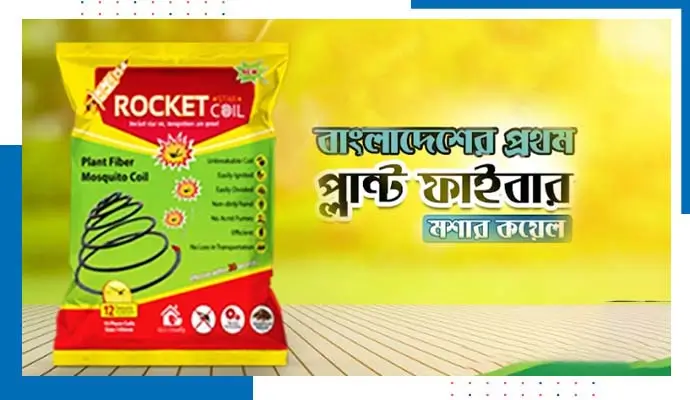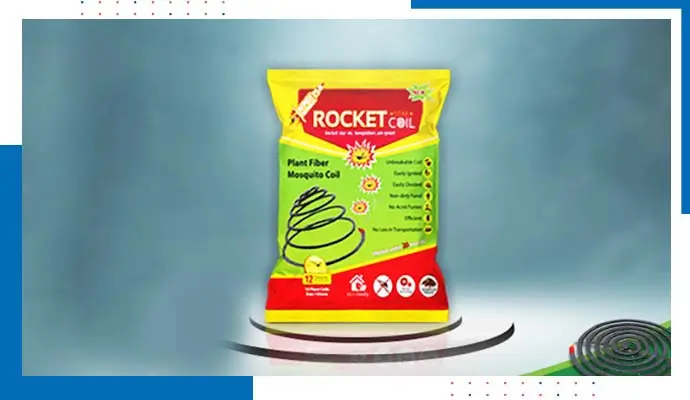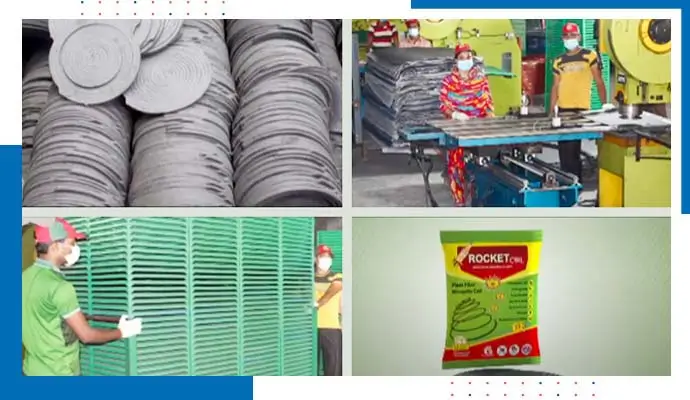Plant fiber mosquito coil in Bangladesh
In the battle against mosquito-borne diseases, mosquito coils have been a staple in many households in Bangladesh. Traditionally made from synthetic chemicals, these coils have raised concerns about their environmental and health impacts. However, the advent of plant-fiber mosquito coils offers a promising, eco-friendly alternative.
This blog will explore the benefits, production, and usage of plant fiber mosquito coils in Bangladesh.

What are plant fiber mosquito coils?
Plant-fiber mosquito coils use natural plant fibers and essential oils as active repellent ingredients. Unlike conventional coils that often contain harmful chemicals like allethrin, plant fiber coils use natural ingredients such as pyrethrum extract, citronella, or eucalyptus oil. These ingredients are not only effective in repelling mosquitoes but also safer for human health and the environment.

Benefits of plant fiber mosquito coils
Plant-fiber mosquito coils offer an eco-friendly and effective solution for repelling insects while minimizing harmful emissions. These natural alternatives provide long-lasting protection, promoting a healthier indoor and outdoor environment. Here we mentioned some of the key benefits:
- Eco-friendly: One of the most significant advantages of plant-fiber mosquito coils is their environmental sustainability. Made from biodegradable materials, these coils reduce the carbon footprint and minimize pollution.
- Healthier alternative: Traditional mosquito coils release smoke that can be harmful when inhaled over long periods. Plant fiber coils, on the other hand, produce less smoke and contain natural repellents that are less likely to cause respiratory issues.
- Effective mosquito repellent: Despite being natural, plant-fiber mosquito coils are highly effective in keeping mosquitoes at bay. The essential oils used in these coils disrupt the sensory receptors of mosquitoes, preventing them from locating humans.
- Pleasant aroma: Unlike the harsh chemical smell of traditional coils, plant fiber mosquito coils often emit a pleasant fragrance, making the environment more comfortable for users.
Production process
The production of plant-fiber mosquito coils involves transforming natural materials into a sustainable alternative for pest control. This eco-conscious manufacturing process not only reduces environmental impact but also ensures a safer option for families and communities.The production of plant-fiber mosquito coils involves several steps:
- Selection of plant fibers: Natural fibers such as coconut coir, wood dust, and other biodegradable materials are chosen for their availability and suitability.
- Extraction of essential oils: Essential oils from plants like citronella, eucalyptus, and neem are extracted. These oils serve as the active ingredients in the coils.
- Mixing and Molding: The plant fibers are mixed with the essential oils and other natural binders. This mixture is then molded into a coil shape.
- Drying: The molded coils are dried to remove any moisture, ensuring they burn evenly when used.
- Packaging: Finally, the coils are packaged and prepared for distribution.

Best quality plant fiber producer | N. Biswas Group
N. Biswas Group is the popular and renowned name for plant-fiber mosquito coil producers in Bangladesh. Here we mentioned some important factors in choosing their mosquito coils:
N. Biswas Group is a leading name in Bangladesh's mosquito coil market, known for its commitment to quality and innovation. Their plant-fiber mosquito coils are crafted with precision to ensure maximum effectiveness and safety.
They adhere to stringent quality control measures to ensure that every coil produced meets high standards of safety and efficacy. The use of natural ingredients and adherence to international manufacturing standards underscore their dedication to providing top-quality products.
The company employs eco-friendly manufacturing processes, minimizing waste and reducing the carbon footprint. This aligns with the global move towards sustainable and responsible production practices.
Conclusion
Plant-fiber mosquito coils represent a significant step towards sustainable and healthier living. In a country like Bangladesh, where mosquito-borne diseases are a serious concern, switching to eco-friendly mosquito repellents can have a profound impact on public health and the environment.
If you are looking for the best quality plant-fiber mosquito coils in Bangladesh contact N. Biswas Group - number 1 mosquito coil producer in Bangladesh.


